Business tools can help you streamline your operations, boost productivity, and gain valuable insights into your business. Whether you’re a small business owner or a manager at a large corporation, these business tools can help you take your business to the next level.
In this article, we have provided useful business tools that can help you run your business as sophistically as large organizations.
By the end of this post, you can decide which business management tools you need for your business.
What are the types of business tools?
Business tools can be categorized in the following categories based on the business function:
- Work management tools: help you manage projects and tasks and create reports
- Communication tools: help you facilitate team communication with both remote and office team
- Document collaboration tools: help you collaborate on documents for efficient working
- Marketing tools: help you design, execute, and track marketing campaigns
- CRM tools: help you manage relationships with clients and provide customer support
- Accounting & HR tools: help you manage finances and human resources
23 Best online business tools to use in 2026
We have shortlisted the best tools for businesses in this list based on my hours of research, real user reviews from top websites, and industry-leader insights. For easy decision-making, We have categorized tools into different categories based on the business function. We hope it helps.
Best work management tools
1. ProofHub
Best for project management and team collaboration
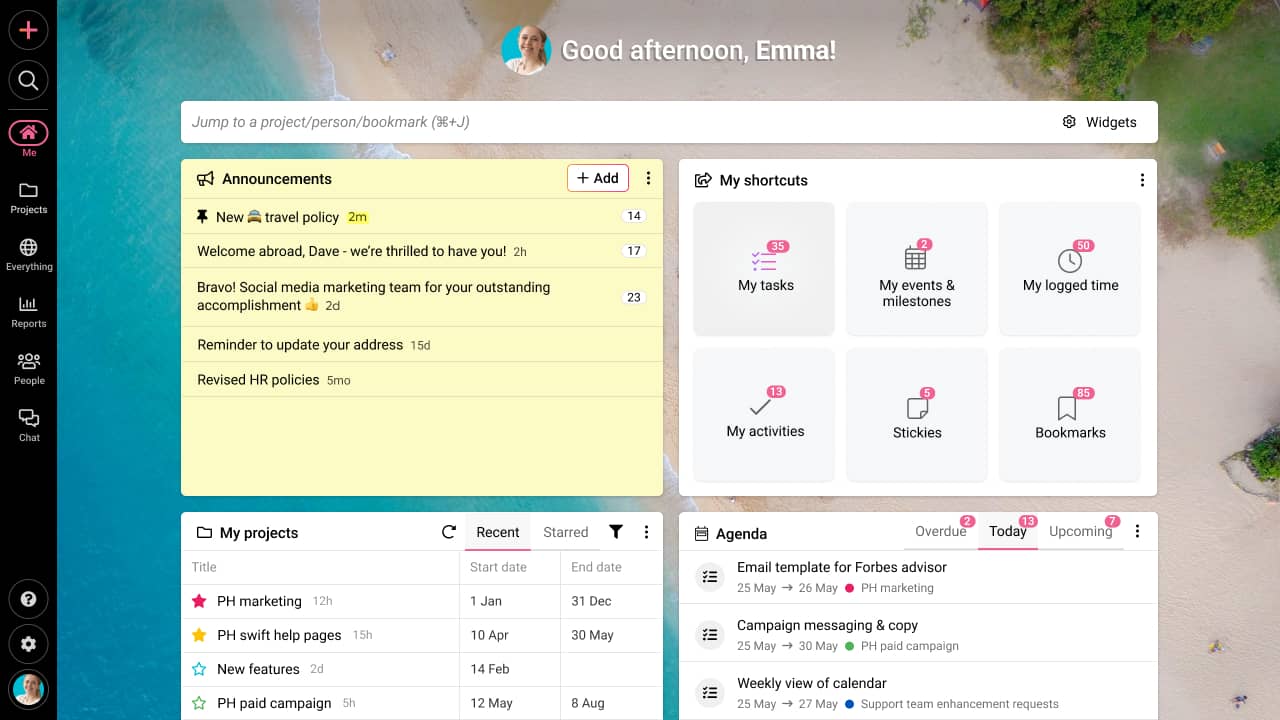
ProofHub is an ultimate project management and productivity platform that helps you work efficiently, collaborate with a team effectively, and avoid workplace conflicts by creating a centralized source of truth for everyone in the organization.
The thing that differentiates ProofHub from others is it provides team collaboration along with work management under one roof.
We have researched many project management tools. They either excel in project management or team collaboration. One aspect is often ignored.
But ProofHub balances both helping you collaborate effectively with a unified interface to work efficiently with the team.
Here is how ProofHub can help your business:
- Bring all the projects to one place (delegate tasks without wasting time): With ProofHub’s all-in-one platform, you can bring all of your projects to one place for easy work management. You can create and delegate tasks easily from your task dashboard.
- Improve your workflow efficiency (with custom workflows): With ProofHub’s custom workflow builder, you can standardize and streamline your business processes to improve work efficiency and the quality of products or services. Everyone knows what steps to follow and how to work.
- Manage your teamwork like a real manager (with a bird’s eye view): You can have a bird’s eye view of all the tasks in real-time in multiple views Kanban, Calendar, Gantt, and Table to track progress. You can also view the tasks of team members that help you plan your resources to maximum efficiency.
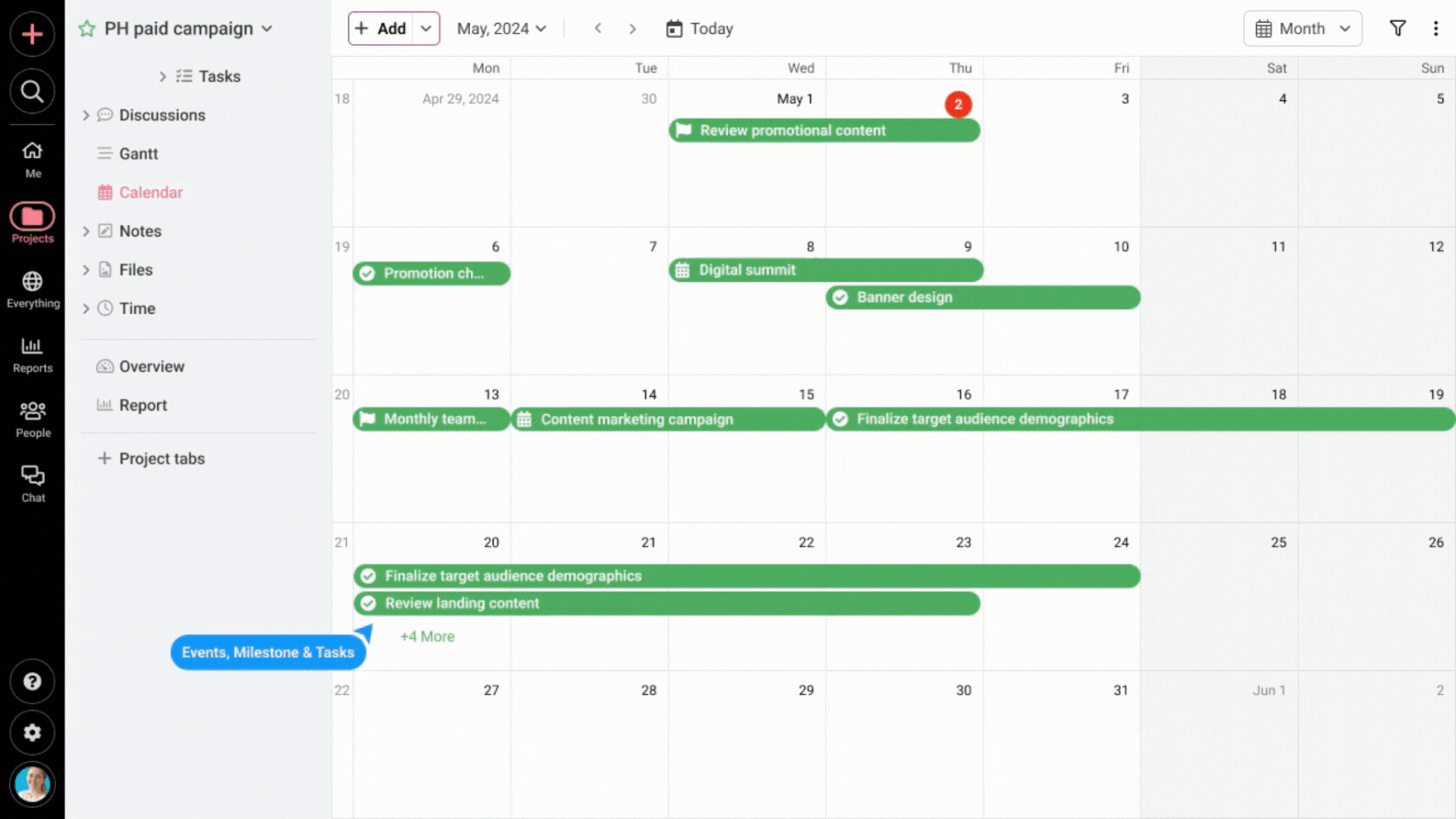
- Communicate with your team instantly: You can immediately request a status update, talk to your team members, share ideas, and find answers to queries with ProofHub’s built-in chat. You can chat one-on-one and create a group also for team discussion.
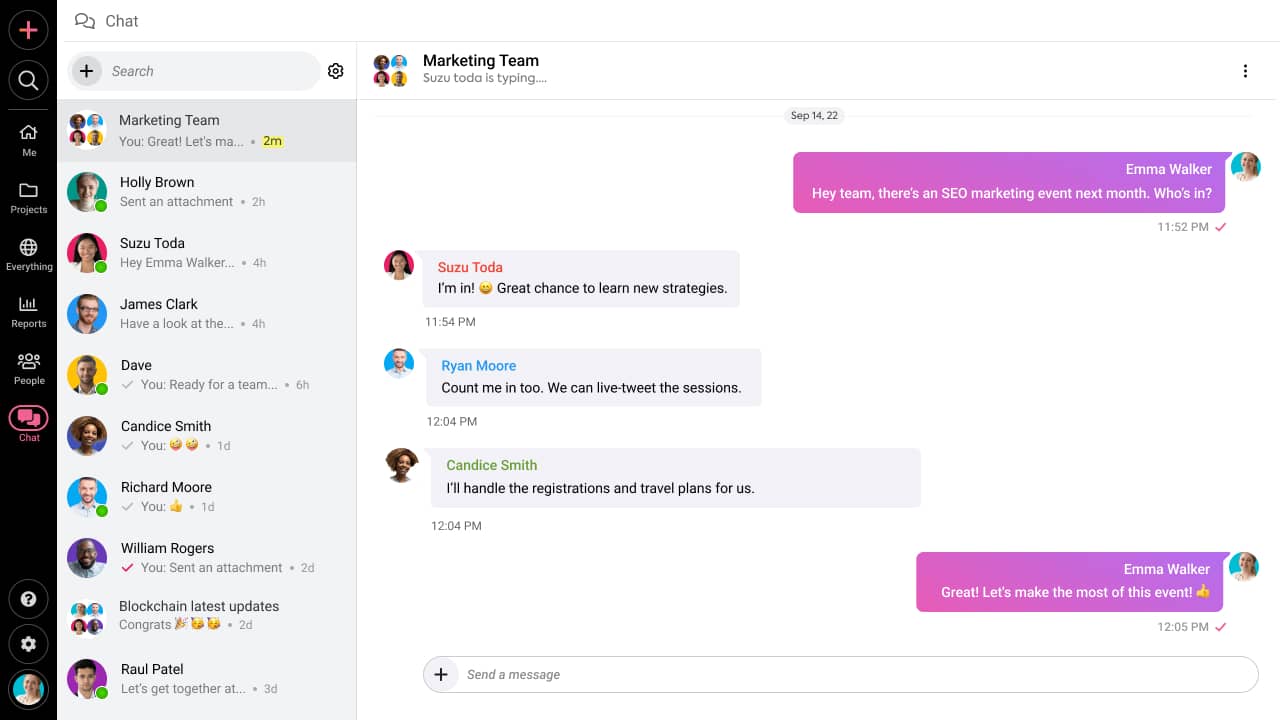
- Share documents easily and save time on finding information: Your team can share the work by attaching files directly to the tasks from a computer or cloud storage such as Google Drive, OneDrive, Box, and DropBox. It keeps everything organized and makes it easy to find files.
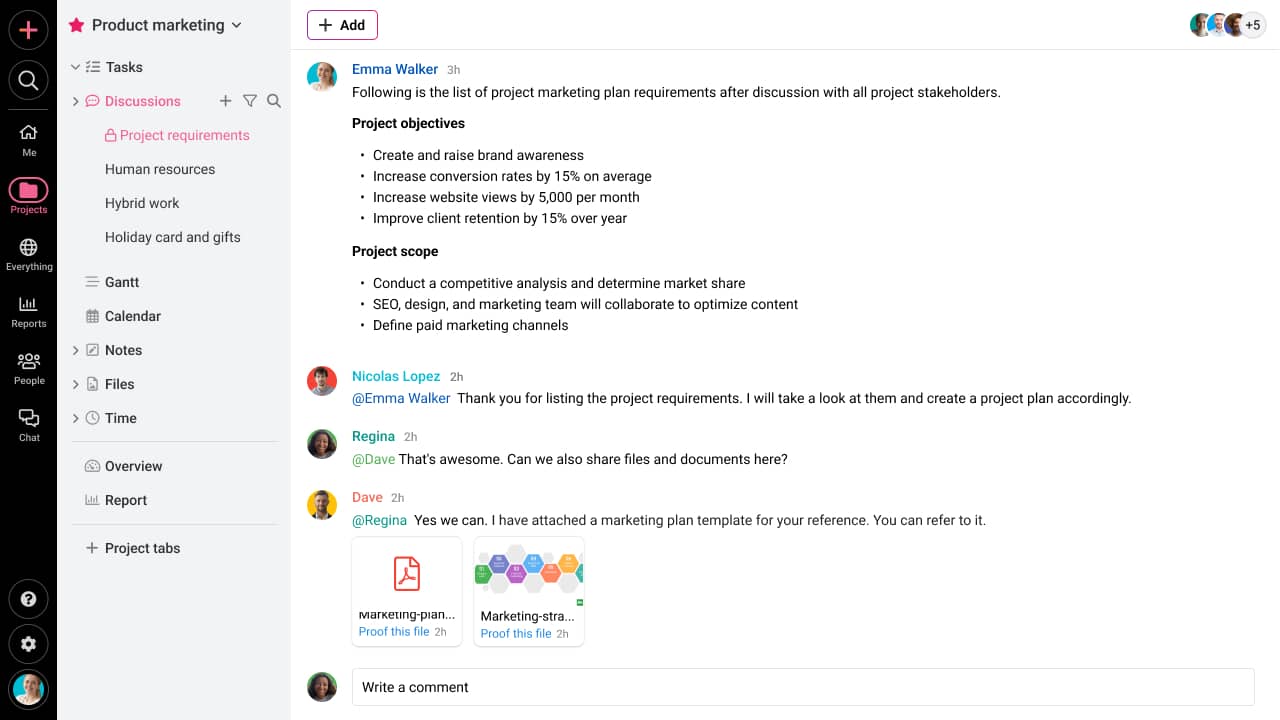
- Get real-time insights into your team performance: You can review the project progress in real-time with easy-to-read pie charts and measure employee performance with timesheets and productivity reports.
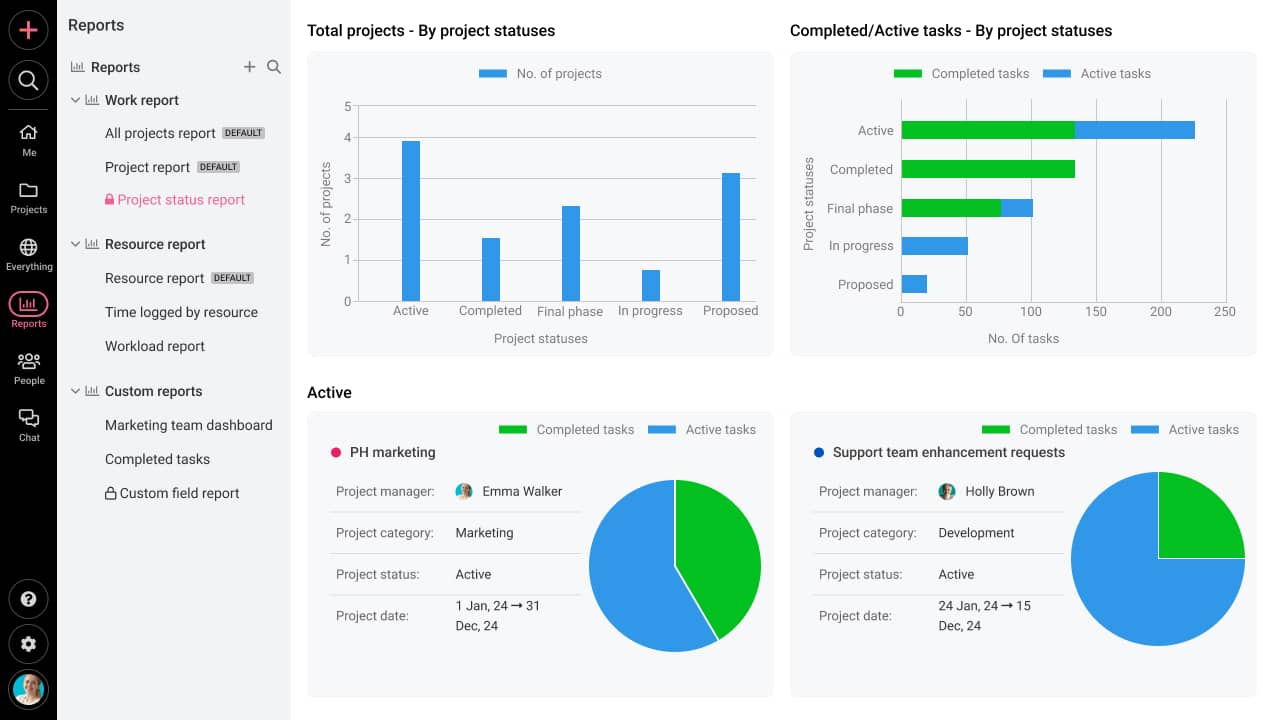
Apart from these features, you can also use:
- Recurring tasks to save time by automating task creation and delegation of repetitive tasks.
- Gantt chart to set task dependencies and visualize projects.
- Project discussions to keep clients engaged throughout the project.
- @mentions task comments to request updates.
- Online proofing to review the work. You can add comments, use annotations, and create file versions for effortless proofing.
- Use notes for sharing important project-related information.
- In-built forms and shareable links for stakeholder engagement.
- Announcements for celebrating team success and recognition.
What do users like about ProofHub?
- A wide range of features under one roof eliminates the need to invest in multiple apps
- Intuitive user interface and minimal learning curve
- No per-user fee. Flat pricing structure for unlimited users
- Customization permissions to users: owner, admin, and normal user
- Ability to set task priorities and add multiple assignees to task
I really like how easy ProofHub is to use. It just makes your life easy with its intuitive and user-friendly interface. Despite a range of features for task management, project planning, resource management, time tracking, project reporting, and team communication, it does not get complex. – Alona S.
What users don’t like about ProofHub?
- Overwhelming notifications
- Limited integration capabilities but useful such as QuickBooks, Slack, and Google Calendar
It has fewer integrations than some other project management tools. – Dharvi S.
Pricing
ProofHub offers two plans:
- The Essential plan costs you $45 per month for unlimited users when billed annually.
- The Ultimate control plan costs you $89 per month for unlimited users when billed annually.
The best thing about ProofHub pricing is flat pricing. There is no per-user fee which makes it highly suitable for businesses.
2. HubSpot
Best work management tools

The HubSpot Starter Bundle is an all-in-one solution that empowers startups and small businesses to grow better. With marketing, sales, and customer service tools unified on one easy-to-use platform, you can attract, engage, and delight customers at scale – without the hassle.
Key features
- Ad tracking & management to launch targeted campaigns & see exactly which ads drive ROI
- AI content writer to effortlessly generate compelling website copy, social media posts, & more
- AI-powered website builder to create custom, responsive websites that convert visitors into leads
- Landing page designer to build high-converting pages that look great on any device without any coding
- Email automation to send personalized marketing emails that engage your audience, minus the manual work
What do users like about HubSpot?
- Simplify your tech stack with an all-in-one platform that eliminates the need for multiple solutions.
- Start small and scale as you grow with affordable pricing plans designed for businesses at every stage.
- Save time and resources with powerful automation and AI tools that streamline your marketing efforts.
- Make data-driven decisions with built-in analytics that provide actionable insights to grow your business.
What do users don’t like about HubSpot?
- Migrating from other systems and getting your team up to speed takes time & effort upfront.
- Requires some initial learning to leverage all the tools & capabilities the platform offers fully.
- Add-ons & increased usage limits come at an additional cost as your contact database grows.
Pricing
- Start bundle costs $20/month/seat. You can pay annually & save 25%, costing just $15/month/seat.
3. GanttPRO
Best for project planning based on a Gantt chart

GanttPRO is a comprehensive business management tool built around an intuitive Gantt chart system. It enables companies to streamline their project planning processes seamlessly, guiding them from concept to completion. A Gantt diagram facilitates breaking down projects into tasks, setting dependencies, and marking key milestones.
Users can also choose additional views, including a board, a list, and a calendar. With real-time collaboration features like mentions, comments, and file attachments, GanttPRO enhances communication among team members and all stakeholders.
It also comes with budget tracking and resource allocation capabilities. Teams of all sizes apply GanttPRO in software development, construction, manufacturing, retail, healthcare, and other spheres.
Key features
- A user-friendly Gantt chart for detailed project planning
- Additional views (a board, list, and calendar)
- Advanced portfolio management
- Professional resource allocation
- Deadline management and time tracking
- Project import and export
- Pre-made Gantt chart templates for an easy start
What do users like about GanttPRO?
- Simultaneous simplicity and power. It helps teams visualize plain tasks and manage complex projects
- Automated task scheduling that saves time and allows for the quick creation of detailed charts
- Enhanced collaboration that streamlines task delegation, progress tracking, and communication among team members
GanttPRO, unlike other tools, saves your time when creating Gantt charts. This is the most practical and fastest planning tool I have ever used. – Luis Daniel M.
What users don’t like about GanttPRO?
- Inexperienced teams with simple projects may find the multifunctional tool too complex and time-consuming
- The integration capabilities with other management tools could be wider
While GanttPRO offers a variety of project management benefits, some users may encounter challenges with its initial learning curve. – Ivan B.
Pricing
- The Basic plan costs $7.99 per user per month when billed annually
- The Pro plan costs $12.99 per user per month when billed annually
- The Business plan costs $19.99 per user per month when billed annually
4. Time Doctor
Best for time tracking
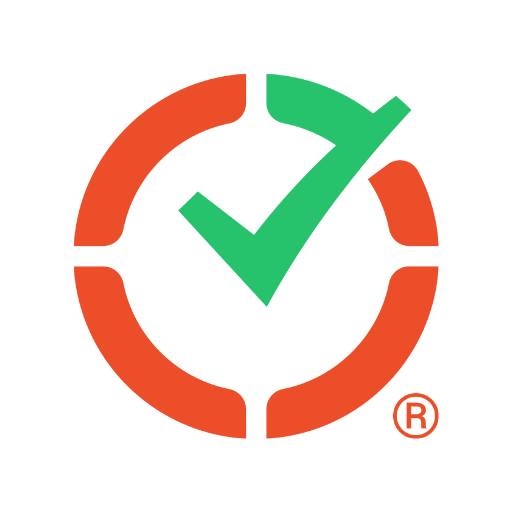
Time Doctor is an employee-friendly time-tracking software that businesses use to track employees’ activity throughout the day to provide you with actionable insights to improve performance. It makes an important part of the tech suite of a business with a remote workforce.
Time Doctor helps you track the time spent by an employee on each project, non-work related sites, and away from the computer and breaks to provide you insights to improve productivity.
The distraction alert feature of Time Doctor sends you a popup alert when someone sits idle on a computer for too long or spends excessive time on YouTube, Facebook, or personal/non-work related sites during work hours.
Key features
- Time tracking and employee monitoring for increased visibility and work insights
- Productivity measuring and summary reports to analyze the performance
- Screenshot, screen recording, and activity levels to record activity
- Distraction alerts to stay focused on tasks
- Online timesheets and payroll for accurate and easy payment
What do users like about Time Doctor?
- Accurate time tracking
- Intuitive and user-friendly interface
- Details report and insights
Time Doctor is invaluable for anyone looking to manage their time more effectively. – Mohamed Y.
What users don’t like about Time Doctor?
- Inaccuracies in screenshots and activity levels
- Poor customer service
- Not easy to cancel a subscription
Screenshots were not always accurate and customer service took a long time to get a hold of. – Andrew B.
Pricing
- The Basic plan costs $5.9 per user/month on the annual plan
- The Standard plan costs $8.4 per user/month on the annual plan
- The Premium plan costs $16.7 per user/month on the annual plan
5. Evernote
Best for individual work organization
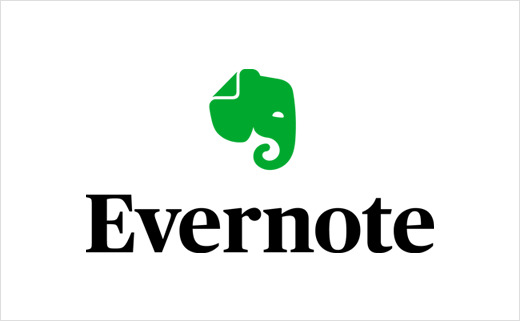
Evernote is an amazing app to organize your work life. It helps you take notes to remember everything, organize your work, and prioritize tasks so that you can work effectively. It makes it easy to find information when you need it.
But it is more than a note-taking app. You can turn your notes into to-dos and create and assign tasks inside your notes with due dates, flags, and reminders.
The thing that differentiates Evernote from other apps is you can add text, images, audio, scans, PDFs, and documents to make notes useful and easily convert them into tasks.
We like the web clipper to save web pages, articles, or PDFs to help you go beyond bookmarks.
Key features
- Quickly take notes by adding visual elements and files
- Sync notes to all devices to work anywhere
- Find notes easily with a powerful search
- Built-in templates to create better notes
- Connect notes to your Google Calendar
What do users like about Evernote?
- Ease of use and intuitive user interface
- Versatile note-taking capabilities
I love how easy and versatile Evernote is. I can quickly add notes, photos, or audio recordings and organize them using tags to ensure my workflow is efficient. – Joey W.
What users don’t like about Evernote?
- Restricted free plans and overpriced paid plans
- Sharing capabilities are limited
- Not powerful software for task management
The app is very slow, many functions have been canceled, and there is no good support. – Carsten S.
Pricing
- Free plan available to get started with limited featured
- The Personal plan costs $14.99 per user/month when billed annually
- The Professional plan costs $17.99 per user/month when billed annually
- The Teams plan costs $24.99 per user/month when billed annually
Read more: Best alternatives to Evernote
6. Zapier
Best for app integration

Zapier is your go-to tool to create a custom workflow for your organization. It connects your business tools to streamline and automate your work processes for better efficiency and higher work productivity.
The best thing about Zapier is it’s no code workflow builder. You do not require coding knowledge to build a custom workflow. You can simply use basic if/then logic.
Key features
- Build custom workflows using custom logic, conditions, filters, and more.
- Multi-step Zaps to maximize productivity
- Transfer to move the bulk data easily from one app to another
- Tables to manage your database
- Integrate with over 5000 apps
What do users like about Zapier?
- No code automation
- Ease of use
- Integrate with all of your daily use apps
Zapier is a very easy-to-use platform, even if I don’t have a lot of knowledge about coding experience I can create Zaps with just a few clicks. – Brandonn G.
What users don’t like about Zapier?
- Price increase. It has become too expensive
- Unreasonable billing practices
- Poor customer support
Unreasonable billing practices and unhelpful support. Cancellation issues. – G2 Reviewer
Pricing
Zapier workflow automation has 4 plans
- Free for basic use with limited features
- The Professional plan costs $19.99 per month when billed annually
- The Team plan costs $69 per month when billed annually
- For Enterprise you have to contact the sales
Best team communication tools
7. Chanty

Chanty is a team collaboration platform for businesses of all sizes. This tool is designed to help companies improve team communication and productivity. It is a multi-functional, cloud-based collaboration tool with automation and project management features.
Chanty offers unlimited searchable message history in all plans, including the free plan. It also offers audio and video conferences, an in-built task manager with a Kanban board, and integration with 3rd party apps.
Key features
- Collaboration platform for business teams
- An unlimited searchable conversation history
- Audio and video conferencing with screen sharing
- Kanban board for task management
- Teambook for easy management of conversations, tasks, links
What do users like about Chanty?
- Unlimited message history in all plans
- In-built task manager and video calling features
Enhances group, 1-on-1, audio, and video calls in real-time.
Screen sharing allows me to annotate content in the cloud and share files seamlessly. – Niraj A.
What users don’t like about Chanty?
- UI could be improved
- Lack of video call invitation by link
This app has all the features required and as of now nothing much. Yes UI can be the area to work upon for better results – Vineet A.
Pricing
Chanty has 2 plans
- Free for teams of up to 5 users
- Business plan costs $3 per user per month when billed annually
8. Slack
Best for team communication

Slack is a dedicated team communication app that makes it easy to work for you and your team in the organization. It provides you with a platform to send instant messages, make audio and video calls, and share files to collaborate effectively.
The purpose of this tool is to bring your team together and align them for efficient collaboration. You can create channels for every project, topic, or team where you can share files, talk about projects, and share tasks to have a shared view of the work being done. So all these uses of Slack make it a useful business tool.
Key features
- Chat, voice calling, and video calling for interactive communication with team members
- Share files and media in the chat
- Slack Huddles for live calling
- Slack Clips to share audio and video messages
- Workflow automation to automate routine communication
What do users like about Slack?
- Easy to navigate and intuitive use interface
- Know team availability with Slack work status messages
- Seamless integration with over 2000 apps
Slack has transformed how teams communicate, collaborate, and stay connected in the digital workplace. – Peter C.
What users don’t like about Slack?
- Expensive than other tools in the same category
- Audio and video call quality needs improvements
- Poor customer support
There are better solutions than Slack. – Jamie M.
Pricing
- Slack offers a free plan but comes with limited features and integrations.
- The Pro plan costs 7.25 per user/month on annual billing
- The Business+ costs 12.50 per user/month on annual billing
- The Enterprise Grid plan is available by contacting the sales
9. Calendly
Best for scheduling appointment

Calendly is an online appointment scheduling platform that helps you automate meeting scheduling to eliminate back-and-forth communication. You can connect your calendar with Calendly, create scheduling links for meetings, and share with others to schedule business meetings.
It automatically sends reminders, follow-ups, and links to reschedule meetings. We find Calendly’s embedded meeting links into call-to-action buttons quite useful when it comes to marketing. It is quite a useful workplace tool for businesses.
Key features
- Share your Calendly availability with others for automated meeting scheduling
- Automatic reminders, follow-ups, and links to reschedule meetings
- Integrate with most of your daily use software such as CRM, PMS, Calendar, payment platform, and video conferencing apps
- Schedule a team based on the availability
What do users like about Calendly?
- User interface. The booking page is quite intuitive
- Support desktop and mobile devices. You can schedule meetings on the go
- Secure platform to schedule meetings
The Calendly platform is very user-friendly and intuitive. It makes the scheduling process so simple when I’m coordinating with people outside of my organization. – Marissa M.
What users don’t like about Calendly?
- Calendly has sync issues when connected with multiple calendars
- Customer support is very slow and hard to reach
No customer support to work out bugs…Support tickets are handled only through email. – Phyllis H.
Pricing
- Free for individuals starting with basic scheduling
- The Standard plan costs $10 per seat/month (billed annually)
- The Teams plan costs $16 per seat/month (billed annually)
- The Enterprise plan starts at $15K annually
Did you know? Every business needs to schedule meetings with clients and team members. And you might be surprised to know the average delay per meeting for employees is 10 minutes and 40 seconds.
10. Zoom
Best for video conferencing

Zoom is a dedicated video conferencing platform that you can use for audio and video calling with your team and clients. From single-session events to online webinars, community events, and group events, Zoom is your one-stop app for virtual video and audio communication for business purposes.
The thing that differentiates Zoom from regular video platforms is its features: in-meeting chat, screen sharing, whiteboarding, transcripts, backgrounds, file sharing, meeting recording, and much more.
Zoom is widely used for its online whiteboarding capabilities which makes it a useful business tool.
Key features
- HD video and audio calling up to 1,000 participants in a meeting
- Screen Sharing, online whiteboarding, and file sharing
- Zoom Chat to communicate with the team
- Zoom VoIP calling
- Email and Calendar invitations and appointment scheduler
What do users like about Zoom?
- Easy to use and user-friendly interface
- Versatile video conferencing platform
- Integrate seamlessly with most daily-use apps
The software is very easy to learn and is beginner-friendly. – Keion L. B.
What users don’t like about Zoom?
- Expensive paid plans
- Bugs in some features
So many bugs! Known user issues date back years and are still plaguing me as a user today. – G2 Reviewer
Pricing
- Zoom offers a Basic plan that can have up to 100 participants per meeting (up to 40 minutes per meeting)
- The Pro plan is priced at $12.49 per user/month when billed annually
- The Business plan is priced at $18.32 per user/month when billed annually
- The Business Plus and Enterprise plans are available by contacting the sales
Best document collaboration tools
11. Google Drive
Best for creating documents and cloud storage

Google Drive is a cloud-based storage tool for businesses that makes it easy to find, share, organize, and store business information in a centralized place. You can create, share, and co-edit various types of business documents for effective content development and collaboration.
The purpose of Google Drive is to make collaboration easy. With enhanced document organization and management, your teams spend less time finding and sharing information and more time working together.
Google Drive file versioning makes it easy to track the changes made by every contributor.
Key features
- Google Docs, Sheets, and Slides for creating documents
- Share documents easily with shareable links and manage permissions
- Powerful search capabilities embedded in Drive to easily find documents
- Co-edit documents in real-time, share feedback with review comments, and track changes with file versions
- Integrate seamlessly with other tech stacks
What do users like about Google Drive?
- Easy to use
- You can use it on a mobile device, tablet, or computer
- Smart compose to help you with writing
Very easy to use and access from anywhere. There are mobile apps to make it easier to open files that are stored on your mobile device while away from the office or studio. – Dan O.
What users don’t like about Google Drive?
- Large file sharing is not easy
- There is no password protection for docs
- Limited offline editing capabilities
Larger file sharing is difficult with Google Drive. Without an internet connection, I cannot able to visit my drive. – Mahmudul Islam S.
Pricing
- Google One offers a 15 GB free storage plan
- The Basic plan offers 100 GB storage for $1.99 per month
- The Standard plan offers 200 GB storage for $2.99 per month
- The Premium plan offers 2TB storage for $9.99 per month
12. Loom
Best for video messaging

Loom is one of the best online tools for businesses to share async video messages to share feedback. It allows you to record your screen and camera to create a video message.
The purpose is to help you save time by creating one video to explain everything clearly and effortlessly rather than sending thousands of messages to and fro to share feedback remotely.
You can use it for free though with limited features and video messages.
Key features
- Record your screen and camera to create a video message
- Respond to videos with interactive features such as emoji reactions and time-stamped comments
- Share the video with a link and recipients can watch a video without logging in or creating an account.
What do users like about Loom?
- It is easy to use
- It works on all devices: computer, browser, and mobile device
Loom is very easy to use. Press record, and you record. Done. I appreciate that the editing tools are also easy to use for people with limited tech backgrounds. – Emily Y.
What users don’t like about Loom?
- It crashes often. You need a good hardware configuration.
- Bad customer support experience
It crashes, you can see the recording time and buttons on the recording. – Verified G2 reviewer
Pricing
- Free to get started for individuals
- The Business plan costs $12.50 per creator/month on annual billing
- The Enterprise plan is available by contacting the sales team
13. Grammarly
Best for grammar check

Grammarly is one of the best tools for online businesses to create grammatically error-free content. It provides you with a range of features to enhance your writing such as grammar, tone, clarity, intent, and more.
Grammarly editing helps me cut out fluff from my writing and make my content free.
Grammarly also has a generative AI that helps you write, rewrite, get ideas, and quickly reply. This tool has become essential nowadays and many businesses use it for writing, editing, and making content more engaging.
Key features
- Grammar Checker to make content grammatically correct
- Plagiarism Checker to make your content unique
- Paraphrasing tool and AI Writing to help you generate ideas
- Tone Detector to provide you insights into content
- Suggestions to improve your content style
What do users like most about Grammarly?
- Easy to use and user-friendly interface
- Availability across devices mobile, computer, and web
- Integrate with most daily-use software to make corrections such as Google Docs, Gmail, Twitter, and LinkedIn
Grammarly is a great tool. We used the tool to ensure our writing for clients has no plagiarism, syntax, or grammar errors. – Thandolwethu Gulwa
What users don’t like about Grammarly?
- Limited features in the free plan
- Plagiarism checks and AI writing are basic
- Expensive paid plan
Somewhat expensive. Grammarly itself does not guarantee 100% correctness. Its MS Office version faces some issues with plagiarism detection. – Aniket K
Pricing
- Free to get started
- The Premium plan costs $12 per month on annual billing
- The Business plan costs $15 per month on annual billing
Best marketing tools
14. HeyGen
Best for creating realistic AI videos without cameras or editing skills
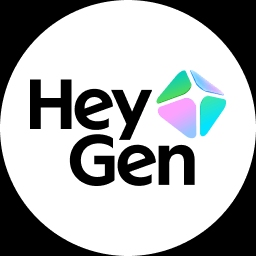
HeyGen is an advanced AI video generator that helps creators, marketers, and teams produce professional videos in minutes. The platform combines lifelike AI avatars, natural voiceovers, and automated editing tools to simplify everything from training videos to social media content. You can generate a complete video using only text, an image, or an audio file, making the process extremely fast and accessible.
HeyGen also includes a powerful translation engine that supports 175+ languages with accurate lip-sync and tone matching. For teams, features like brand kits, collaboration tools, and customizable avatars help maintain consistency across projects. Whether you’re creating onboarding modules, marketing explainers, or personalized outreach videos, HeyGen streamlines production from start to finish.
Key features
- Create videos instantly from text, images, or audio
- Lifelike AI avatars with natural gestures and expressions
- Translate videos into 175+ languages with accurate lip-sync
- 1,000+ AI voices and voice cloning support
- Collaboration workspace, brand kits, and templates
What do users like about HeyGen?
- Realistic avatars that look and move naturally
- Easy-to-use editor suitable for non-creators
- Fast translation and localization for global content
“HeyGen helps us produce high-quality videos in minutes instead of days.” – Verified User
What users don’t like about HeyGen?
- Advanced avatar features are available only on paid plans
- High-resolution 4K output requires the Team plan
“Great tool overall, but some of the more impressive features sit behind higher-tier plans.” – Verified User
Pricing
- Free plan with 3 videos/month
- Creator plan starts at $29 per month
- Team plan starts at $39/seat per month, billed annually
15. WordPress
Best for website content management

WordPress is one of the most popular content management systems (CMS) for creating, modifying, and publishing website content. WordPress makes it easier to manage your website, publish content, optimize for SEO, and customize it without a deep technical knowledge of coding.
WordPress offers various plug-ins, through which you can customize your websites easily and add new functions without any technical knowledge.
WordPress provides you with a wide range of features to save time on content management. You can make changes to the website content and publish it without writing long codes. It helps you to publish content easier and faster and reduces the time you spend managing your website. The functionality of WordPress makes it the best online business tool.
We like the content scheduling feature of WordPress. It helps businesses schedule a content calendar.
Key features
- Create, edit, and publish website content
- Track each piece of content’s revision history
- Add and modify user roles and permissions
- Content scheduling, plugins, rich text editor, themes, and more
- Search through your repository of content
What do users like about WordPress?
- Ease of use and beginner-friendly
- WordPress plug-ins to help with content management
I like how easy it is to design a website and have it published in very little time…With WordPress, choose a theme, put on some content and your website is online. – Will V.
What users don’t like about WordPress?
- Lack of phone support and optimization
- Requires technical knowledge to use advanced function
Coding knowledge is required for more advanced customization. – Forbes Review
Pricing
WordPress is free to install. However, you might have to pay for certain plugins, WooCommerce, Elementor, or other additional tools.
16. Canva
Best for graphic designing

Canva is a popular free graphic design tool for small businesses to create professional designs for visual content. You can create social media posts, presentations, posters, videos, logos, and more for free with Canva.
Canva library has thousands of design templates, images, and quality content. It helps you create professional designs in no time which makes it the best best business tool.
Key features
- Create professionally designed visual content
- Keep your work organized with team folders
- Built-in templates to create professional designs
- Plan, create, schedule, and publish social media posts directly from Canva
- Collaborate with team using built-in comments to communicate, keep content moving, and resolve suggestions in real-time
What do users like about Canva?
- Ease of use
- It’s free
- Built-in templates
The best I like about Canva is that I’m able to make designs, reports, logos, and a lot more graphics within a few minutes without asking for help from a professional graphics designer. – MIRAJ K.
What do users don’t like about Canva?
- Customer support is poor
- There are bugs
- Billing practices are not fair
It has the worst billing and customer support system. – Anjali S.
Pricing
- Free for individual users
- Canvo Pro costs $12.99 per month or $119.99 per year for 1 person
- Canva Teams costs $159.90 per year for 1 person (allows collaboration)
17. Mailchimp
Best for email marketing

Mailchimp is one of the best email marketing automation platforms to win new customers and provide exceptional customer care to your existing customers. It helps you run effective email marketing campaigns for your brand with customer behavioral insights and assistance from AI.
You can deliver personalized emails to the right audience based on your customer’s buying behavior, survey responses, chat interactions, and other key analytics.
It is a great online business tool for sending mass business emails, but be aware that its prices get steep pretty quickly. It even charges for unsubscribed and inactive contacts.
Key features
- Create automated personalized email campaigns with market segmentation
- Insights to deliver personalized emails based on buying behavior, survey responses, and predictive analysis
- Market automation to trigger emails based on customer behavior
- Templates and content creation to create emails
- Reporting and analytics for insights
What do users like about MailChimp?
- Intuitive user interface
- Robust features
- Marketing automation to save time and efforts
Mailchimp’s intuitive interface and robust feature set allow anyone to easily build mailing lists and create campaigns perfectly suited for newsletters and promotions. – Jim N.
What users don’t like about MailChimp?
- Learning curve. Needs time to get used to the software
- Poor customer service
I try to email and call and is impossible to talk to customer service. – Angie G.
Pricing
- Free to get started with 1,000 emails per month
- The Essentials plan costs $4.59 /month for 12 months (send 5,000 emails per month)
- The Standard plan costs $6.86 /month for 12 months (send 6,000 emails per month)
- The Premium plan costs $137.24 /month for 12 months (send 150,000 emails per month)
18. Sprout Social
Best for social media management

Sprout Social is a complete social media management software that helps you create, schedule, and publish content on social media, manage your social media engagement, and track your social media journey with data-driven insights using analytics.
You can manage all your business social media accounts including YouTube, Twitter, Instagram, Facebook, and Pinterest from one single place. This is a great tool for businesses to manage their social media presence.
Key features
- Create social posts and easily share
- Schedule your posts across all platforms at once
- Analytics for Instagram, Facebook, TikTok, Twitter, and more to measure performance
- Engagement to view all conversations in one platform
- Detailed reports to provide you with insights
What do users like about Social Sprout?
- Easy to use, learn, and set up
- All features under one platform
- Automated chatbot to interact with the audience
Sprout has everything you could need from a social scheduling and reporting tool. – Alyssa L.
What users don’t like about Social Sprout?
- Poor onboarding experience
- Overpriced
The customer service is abysmal and the pricing structure is deliberately over-complicated. – G2 Reviewer
Pricing
- The Standard plan costs $199 per seat/month when billed annually
- The Professional plan costs $299 per seat/month when billed annually
- The Advanced plan costs $399 per seat/month when billed annually
19. Google Analytics
Best for website analysis

Google Analytics is your free website analytics tool that helps you analyze data of the users on sites and apps to better check the performance of your marketing campaign. It is among the best tools for an online business to take control of its marketing campaign.
The most impressive thing about this tool is it combines insights with advertising. This helps you drive results for your business.
Even beginners can use this tool to produce better marketing campaigns. Also, Google Analytics can be used to craft high-ROI marketing campaigns.
Key features
- Data insights and reports to see how customers interact with your sites and apps
- Set goals and track conversions
- Modeling and AI to predict user behavior
- Integration with Google Suite of advertising products
- Data collection and management for better insights such as Bounce Rate, and Engagement Rate
What do users like about Google Analytics?
- Real-time data about site visitors
- User-friendly interface
- It is free
Google Analytics empowers me to make data-driven decisions and optimize marketing strategies for maximum performance. – Sai P.
What users don’t like about Google Analytics?
- It gets complex for beginners
- Customer support is not so good
It’s really hard to use and by the time you get used to your workflow, they change the user interface. – G2 Reviewer
Pricing
- Google Analytics is free of charge.
Best CRM tools
20. Zoho CRM
Best for client relationship management

ZohoCRM is a competent CRM platform to manage the sales, marketing, and customer support activities of your organization. It helps you manage a large customer database, automate marketing, sales, lead management, and customer experience to improve work efficiency, and provide business intelligence to make informed decisions.
The ability to create a joined business system is what we look for in a CRM. Zoho CRM provides you with that capability by unifying business data across departments to deliver a more compelling customer experience and effective business communication for profitable operations.
Key features
- Salesforce automation to run sales operations efficiently
- Customer service to resolve all your customer issues
- Multichannel marketing to manage marketing campaigns from one place
- Improve customer experience with multichannel support
- Business intelligence to make an informed decision
What do users like about Zoho CRM?
- Zia AI feature of Zoho for predictive analysis
- Intuitive and user-friendly interface
- Onboarding assistance
- Integration with most Gmail and daily-use apps
A great CRM with good integration. – Gartner Reviewer
What users don’t like about Zoho CRM?
- Limited features in the free plan
- Slow speed and bugs
- Poor customer support
The platform has too many known bugs and they do nothing to solve them. – G2 Reviewer
Pricing
- The Standard plan costs $14 /user/month billed annually
- The Professional plan costs $23 /user/month billed annually
- The Enterprise plan costs $40 /user/month billed annually
- The Ultimate plan costs $52 /user/month billed annually
21. ZenDesk
Best for customer service and ticket management

ZenDesk is customer service software that helps you run your business customer support like a pro. It provides you with a centralized platform to track, organize, and solve all your tickets. You can run multi-channel support with ZenDesk.
It used the power of AI to send tickets to the best agent for the job, solve customer issues faster, and turn data into useful insights.
ZenDesk Bot is quite impressive and it is built on billions of real customer service interactions to deliver exceptional personalized support. You can run lower-cost support from day one.
Key features
- CRM to see your customer data in one place
- Ticketing system to track, organize, and solve all your tickets
- Messaging for personalized conversations across channels
- Speak directly to customers with voice calling
- AI and automation to solve customer issues faster with AI
What do users like about ZenDesk?
- Routing and intelligence that send tickets to the best agent for the job
- It integrates with most of your daily use software
- Easy to use and navigate
Zendesk was able to offer an omni-channel support system with custom workflows, customer self-serve options, and paths. – Kevin L.
What users don’t like about ZenDesk?
- Poor customer support
- Expensive paid plans
The product has good offerings, but customer support/account management teams are terrible to work with. – Jeffrey B.
Pricing
- The Suite Team plan costs $55 per agent/month when billed annually
- The Suite Growth plan costs $89 per agent/month when billed annually
- The Suite Professional plan costs $115 per agent/month when billed annually
Best accounting & HR tools
22. FreshBooks
Best for accounting

FreshBooks is your one-stop accounting software to manage the finances of your business. It helps you with almost everything: accounting, bookkeeping, time tracking, payroll management, invoices, project estimates, reporting, and client management.
You can make entries, track expenses, and analyze the business’s financial health with profitability reports, cash flow health, and details of your spending. It is an accounting software built for business owners.
Key features of FreshBooks
- Create professional invoices and send automated payment reminders
- Time tracking to keep track of logged time and automatically add it to invoices
- Automated online payment options (like automated recurring billing) to receive payments from clients
- Import expenses from your bank account and track every dollar spent for tax time
- Take control of your accounting with easy-to-use accounting tools
What do users like about FreshBooks?
- Versatile tool with loads of features under one roof
- Easy to use
FreshBooks has improved our accounting and expense management…It is excellent, very useful, and easy to use…Its interface is well-designed. – Mindi M.
What users don’t like about FreshBooks?
- Expensive paid plans
- Poor customer support
- Interface issues with upgraded version and bugs
The New FreshBooks results in lower productivity. They have stopped answering my emails. – G2 Reviewer
Pricing
- The Lite plan costs $9.50 per month for sending invoices to up to 5 clients
- The Plus plan costs $16.50 per month for sending invoices to up to 50 clients
- The Premium plan costs $30 for sending unlimited invoices to unlimited clients
23. BambooHR
Best for HR and Payroll management

BambooHR is your complete software to manage all the Human Resources tasks from hiring and onboarding employees to performance management, employee experience, payroll management, and more.
It provides you with all the tools you need to make hiring fast and effective, such as Applicant Tracking System (ATS), New-Hire Onboarding, Offboarding employees, and Electronic Signatures.
The performance management and employee satisfaction with eNPS are quite impressive because once your business grows, you need to pay attention to employee satisfaction to retain people.
Key features
- Hiring and onboarding platform.
- Payroll management and time tracking.
- Employee experience and performance management.
- HR data management and reporting.
What do users like about Bamboo HR?
- Ease of use. Everyone can easily learn to use it.
- Versatile features such as E-signatures, employee wellness surveys, and admin controls.
I love how easy Bamboo HR is to use. As a small organization that does not have dedicated HR, it makes it easy for everyone from the administrators to managers to the employees to use. – Lara W
What users don’t like about Bamboo HR?
- Limited payroll management capabilities
- Limited integrations with other software
- Limited reporting and customization capabilities
I wish there was an integration between Bamboo and QuickBooks. Hopefully, that will happen eventually and make our payroll lives even easier! – Sally C.
Pricing
- BambooHR has two plans Core and Pro. Pricing is available through a call or by filling form on the pricing page.
Factors to consider when choosing a business tool
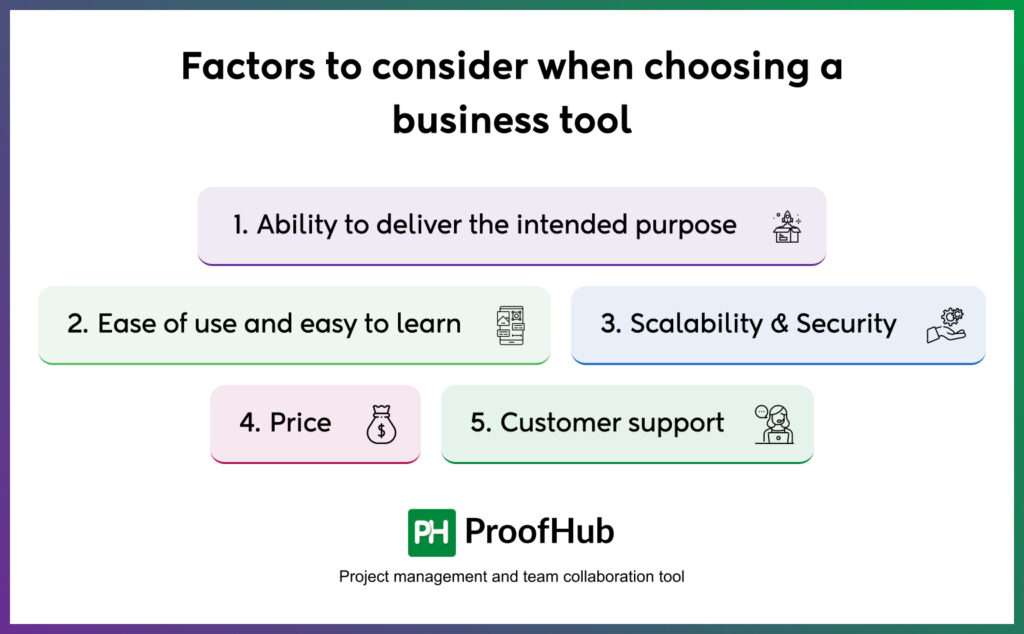
Choosing the business tools has a direct impact on performance, efficiency, adaptability, and convenience.
Here are some important factors that you should take into consideration while choosing business tools:
- Ability to deliver the intended purpose: A tool should be powerful enough to deliver the intended purpose. Make sure it has all the features you need to manage your business function. If you need some additional features, take that into account too.
- Ease of use and easy to learn: If it is not easy to use, people will not use it. A tool should have a user-friendly and intuitive interface and be easy to learn and use.
- Scalability & Security: Most of the tools are scalable and secure. However, the scalability and security needs of an enterprise would be different from those of a small business. Choose the tool that can serve your organization’s current and future needs.
- Price: Business tools can range from free to expensive. You need to evaluate the value you are getting out of it, which includes support, training resources, offers, and per-user cost. Evaluate all the options and choose the one that offers the best value.
- Customer support: You need support from time to time. Many good tools even lack support. Customer support should be good enough to help you when you need it.
Why business tools are important?
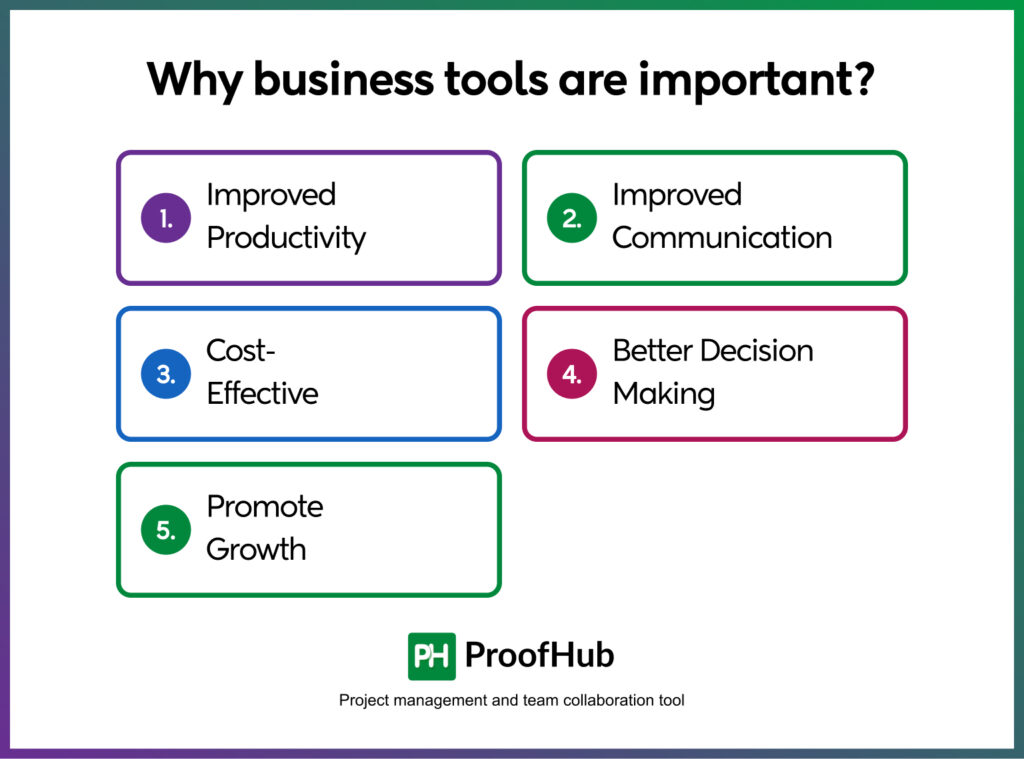
Business tools can help your startup or new business get started in the right direction. They help in managing various aspects of the business efficiently and effectively. Here are some of the key reasons why business tools are important:
- Improved Productivity: Business tools help in automating several repetitive tasks resulting in saving time and allowing the team to focus on critical tasks. This helps improve the productivity and overall efficiency of the business.
- Improved Communication: Communication is key to the success of any business. Tools for businesses such as messaging apps, video conferencing software, and project management tools help in improving communication between team members and stakeholders.
- Cost-Effective: Most business tools are available at a reasonable price, which makes them an affordable solution for businesses. By investing in the right tools, businesses can save time and money in the long run.
- Better Decision Making: With the help of business tools, startups, and organizations can easily collect and analyze data related to their business. This data can be used to make informed decisions about the company’s future.
- Promote Growth: As businesses grow, they need tools that can scale with their business to fulfill changing needs. It supports business growth by empowering workers to work efficiently.
Get started with ProofHub
The first step is always the difficult one. So, why not make it worth all the effort?
ProofHub is one tool that serves many business operations: work management, team communication, document management, accounting, time tracking, online proofing, and client management.
With ProofHub, you can stay on top of your work management, keep everyone on the same page, and make it easy for everyone to work with the least resistance.
FAQs about business tools
What is the most important tool in business?
Every business function requires a good tool but some of the most important business tools include work management software, team communication, document collaboration, CRM tools, and marketing tools.
Which five tools are essential to a business?
The five essential tools for business are ProofHub, Google Drive, Grammarly, ZohoCRM, and Google Analytics.
Why are business tools used?
Business tools are used to standardize and streamline business operations, make it easy to collaborate with a team, and improve work efficiency and team productivity.
What are the examples of business tools?
ProofHub, Zapier, Hubspot, Slack, BambooHR, Freshbooks, and Google Analytics are a few examples of business tools.
What are the 7 functional areas of business?
The top 7 functional areas of business include production and operations, sales and marketing, accounting and finance, Human Resources, research and development, procurement, and strategy.

